
The Best Elicit Alternatives to Know in 2025
AI tools have made research faster and easier. If you're exploring alternatives to Elicit, here are the top options for 2025:
- Sourcely: Affordable AI-driven search with multilingual support, citation tools, and PDF downloads.
- Semantic Scholar: Free, citation-based search with access to 200M+ academic papers and impact metrics.
- Research Rabbit: Visual research mapping and collaboration tools, ideal for team projects.
- Iris AI: Advanced systematic review and visual mapping for deep research analysis.
- Perplexity AI: Conversational search with real-time data and file analysis.
Quick Comparison
| Tool | Key Features | Free Plan | Paid Plan | Best For |
|---|---|---|---|---|
| Sourcely | Multilingual search, citation generator | Limited searches | From $5/month | Budget-friendly source discovery |
| Semantic Scholar | Citation tracking, impact metrics | Full access | N/A | Citation-focused reviews |
| Research Rabbit | Visual mapping, collaboration | Full access | N/A | Visualizing research connections |
| Iris AI | Systematic reviews, data extraction | Limited features | Custom pricing | In-depth literature reviews |
| Perplexity AI | Real-time search, file analysis | 5 Pro searches/day | $20/month | Conversational AI research |
Each tool has unique strengths. Choose based on your research needs, budget, and workflow preferences.
AI Literature review tool: Elicit Vs SciSpace
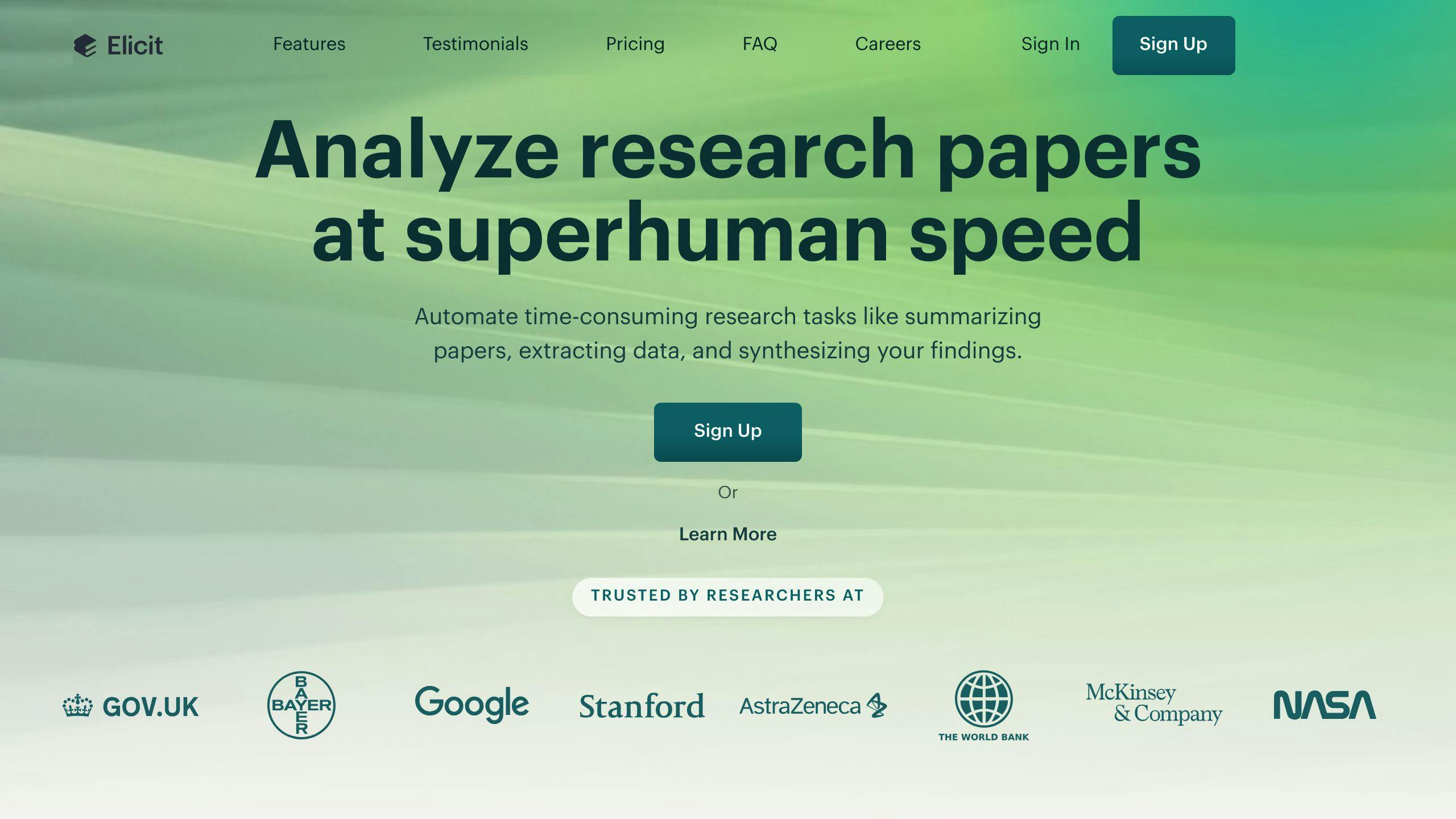
1. Sourcely
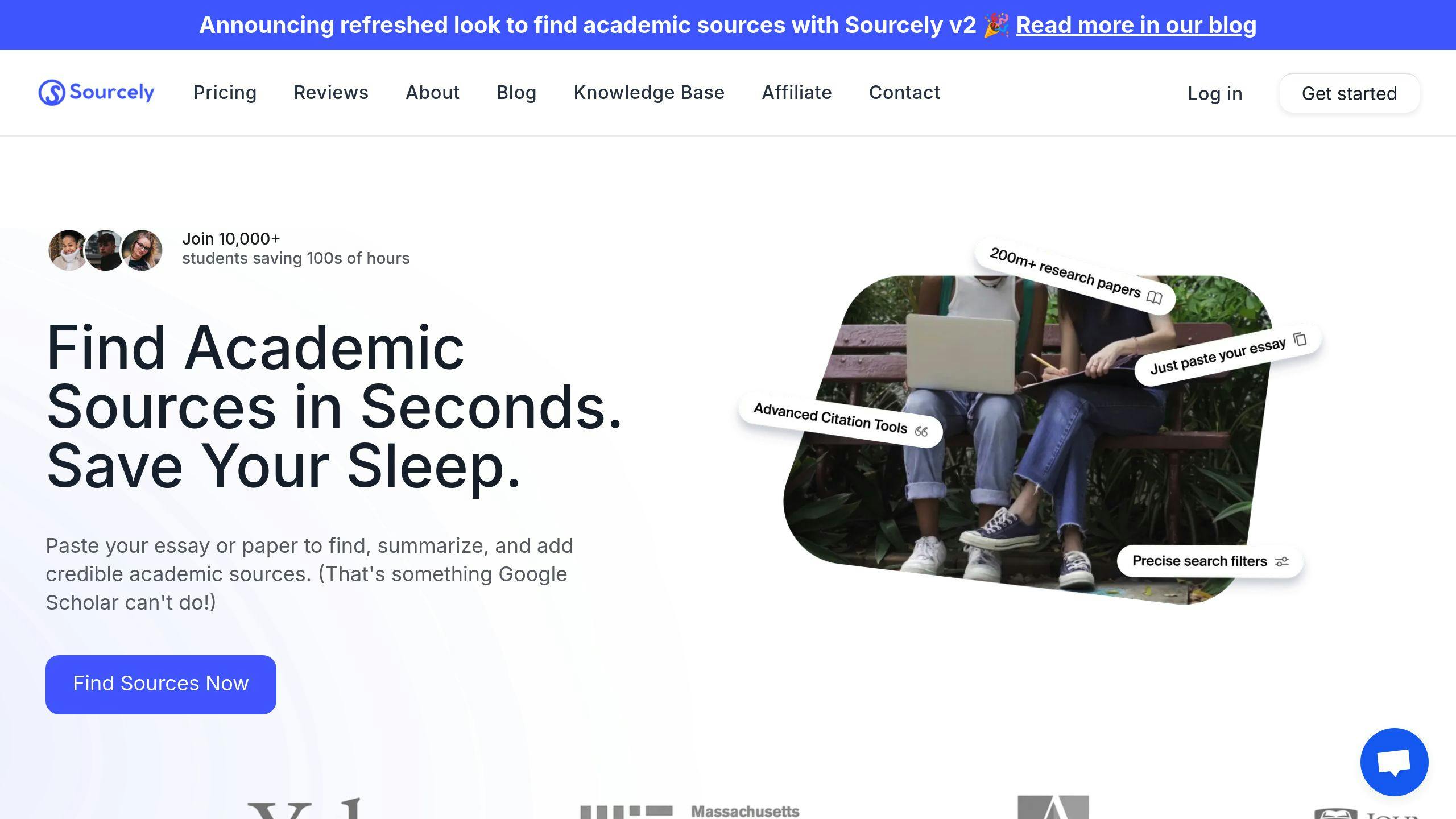
Sourcely combines AI-driven search capabilities with a straightforward, user-friendly design. Its advanced filtering system allows users to refine searches by date, field, or source type, making it easier to navigate academic databases and streamline research efforts.
One standout feature is its automatic citation generator, which supports multiple formats like APA, MLA, and Chicago, removing the hassle of manual formatting. The platform also includes multilingual support, which is especially helpful for researchers working on global literature reviews.
Here’s a breakdown of Sourcely’s pricing plans:
| Plan | Price | Key Features |
|---|---|---|
| SourcelyFREE | $0 | Basic search with results limited to 300 characters per query |
| SourcelyPRO 2000 | $9 | Search capabilities for up to 2,000 characters |
| SourcelyPRO Monthly | $17/month | Unlimited searches and PDF downloads |
| SourcelyPRO Yearly | $167/year | All PRO features with a 20% discount over monthly |
The platform also saves time with its source summarization feature, which condenses academic papers into concise summaries. This is especially useful for managing literature reviews efficiently [2]. For those familiar with Elicit, Sourcely offers comparable search features while adding perks like citation exports and PDF downloads [2][3].
If you're juggling tight deadlines or working with diverse sources, Sourcely is a great choice. However, for researchers looking for tools that include visual research mapping or collaboration options, the next tool, Semantic Scholar, might be worth exploring.
2. Semantic Scholar
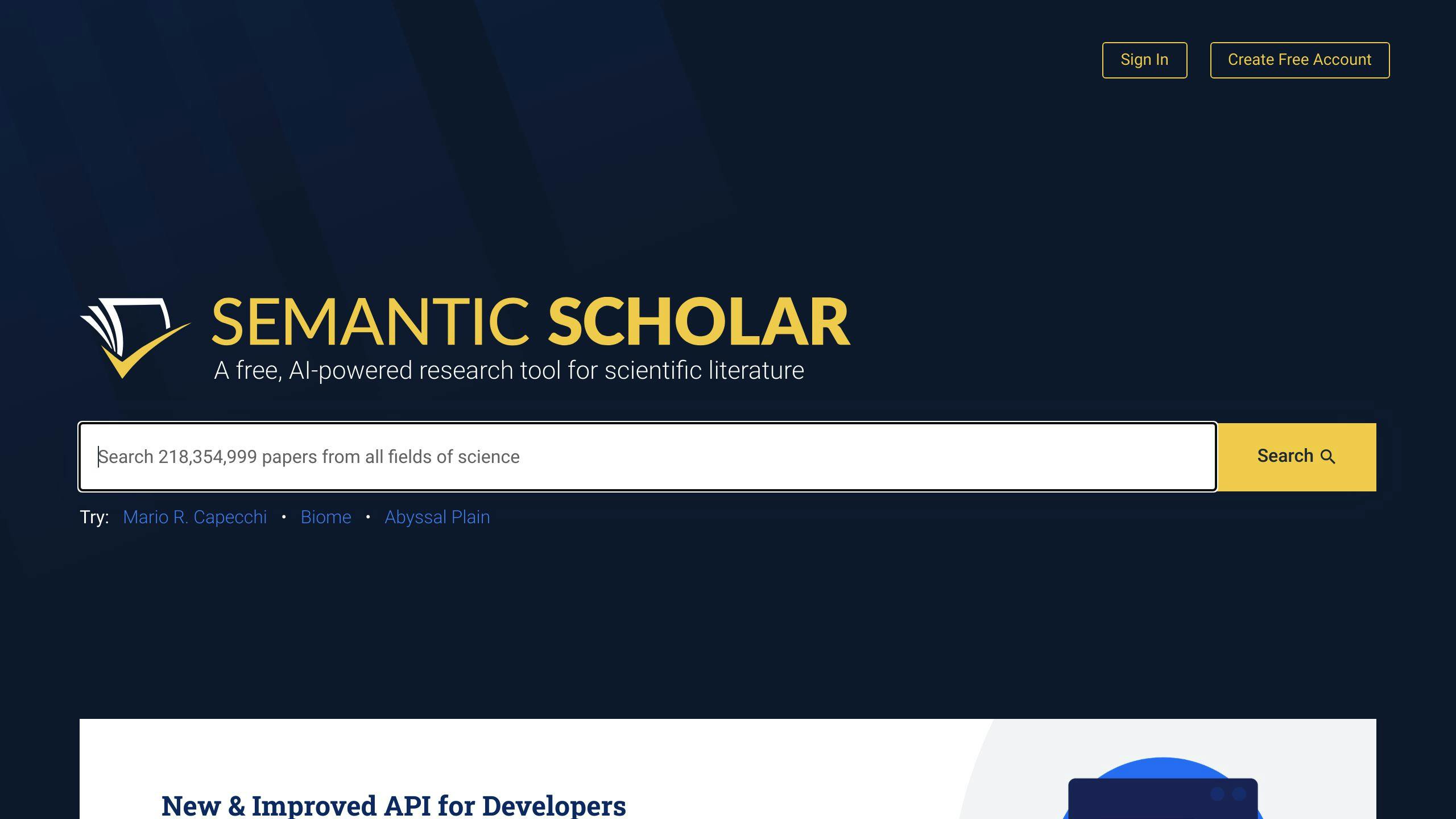
Semantic Scholar is a free research platform developed by the Allen Institute for AI. It provides access to over 200 million academic papers, leveraging advanced AI-driven semantic search to deliver precise results. Unlike Elicit, it offers a fully free solution with a strong emphasis on credible sources and efficient research tools.
What makes Semantic Scholar stand out is its ability to find relevant papers even when you're dealing with vague or unfamiliar terms. Instead of relying solely on keywords, it uses semantic understanding to streamline the research process, making it far more effective than traditional search engines.
Key Features for Academic Research
Semantic Scholar simplifies research with tools designed specifically for academic writing:
| Feature | Description | How It Helps |
|---|---|---|
| Citation Export | Supports APA, MLA, and Chicago formats | Eliminates the hassle of manual formatting. |
| Author Profiling | Tracks publication history and impact metrics | Identifies key researchers in your field. |
| Analytics & Recommendations | Evaluates impact and suggests related papers | Makes finding credible sources easier. |
The platform also includes intuitive filters, allowing users to narrow search results by publication date, field of study, or impact factor. Its AI-powered summarization tool helps researchers digest content quickly, going beyond the basic summarization features found in other tools.
Credibility and Accessibility
Semantic Scholar evaluates sources based on citation patterns, author reputation, and publication venue, ensuring high-quality results. It also offers a mobile app and integrates with citation tools, making it easy to conduct research from anywhere.
While Semantic Scholar is excellent for managing citations and ensuring source credibility, it lacks features like visual research mapping and collaboration tools. For those, Research Rabbit might be a better fit - more on that in the next section.
3. Research Rabbit
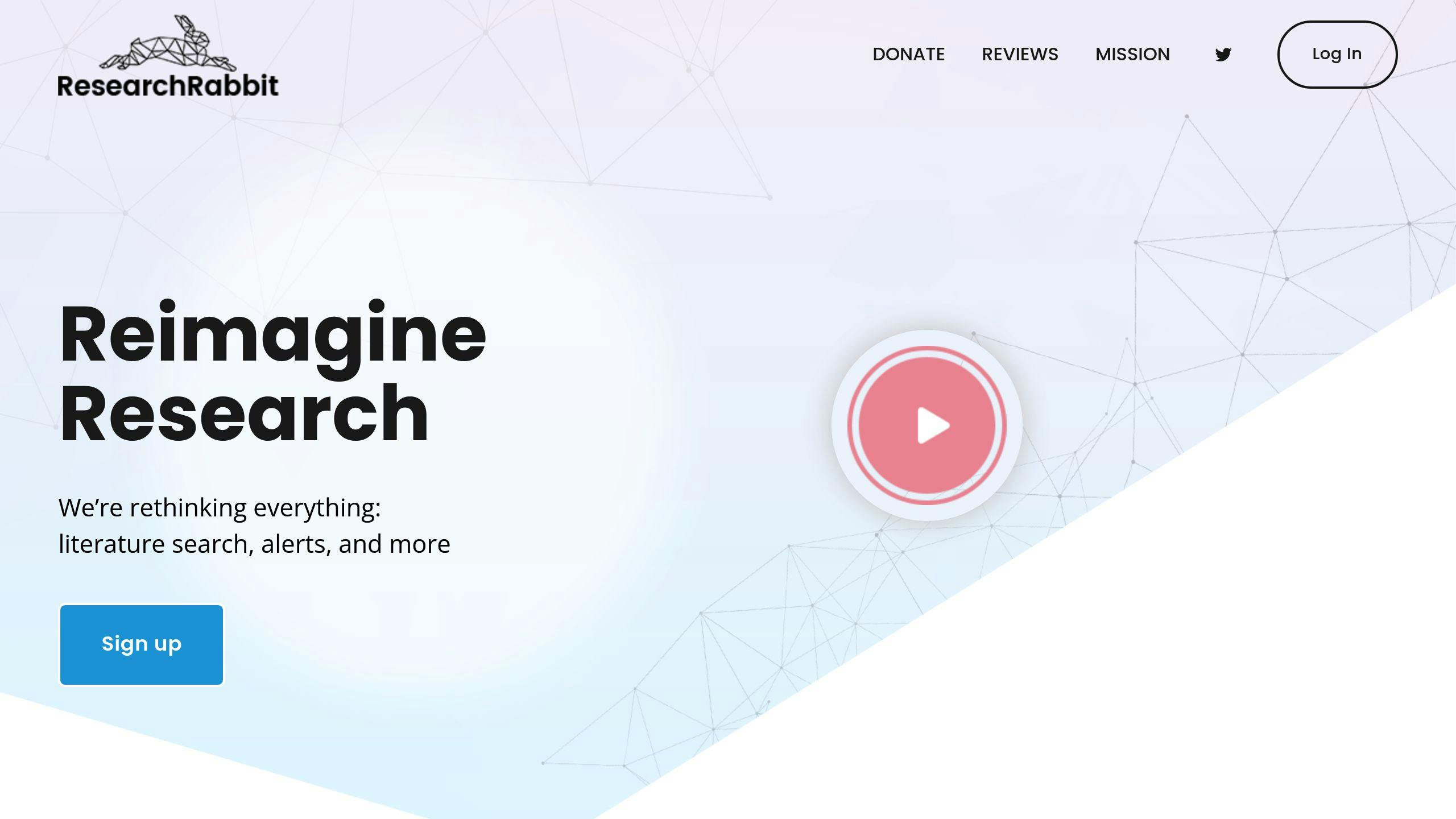
Research Rabbit offers a free platform that combines visual mapping and AI to simplify academic research. It helps researchers find and organize academic literature, presenting a fresh way to dive into and understand their fields.
Visual Research Experience
Research Rabbit creates visual networks that link papers, authors, and citations, giving a clear snapshot of your research area. This setup enables researchers to:
- Find related papers through visual connections.
- Spot key authors in specific topics.
- Follow citation trails between publications.
Features to Simplify Research
Its AI adapts to your research habits, tailoring recommendations based on your interests and reading history.
| Feature | What It Does | How It Helps |
|---|---|---|
| Collection Sharing | Enables collaborative research | Perfect for team projects |
| Paper Networks | Maps research connections | Helps find knowledge gaps |
| Smart Recommendations | Offers personalized suggestions | Speeds up literature reviews |
| Zotero Integration | Organizes citations seamlessly | Simplifies referencing |
Key Points to Keep in Mind
Research Rabbit uses data from Microsoft Academic Graph, last updated in 2021. This means it might not include the most recent studies. To get a complete picture, consider using it alongside other tools.
Collaboration Features
This platform is great for group projects, offering shared collections, collaborative annotations, and group research libraries. Its Zotero integration makes citation management easy, especially for teams working together.
If you're looking for a free tool that emphasizes visual connections and teamwork, Research Rabbit is a strong choice. While it shines in visualization and collaboration, Iris AI brings advanced tools for deeper research analysis, which we’ll cover next.
sbb-itb-f7d34da
4. Iris AI
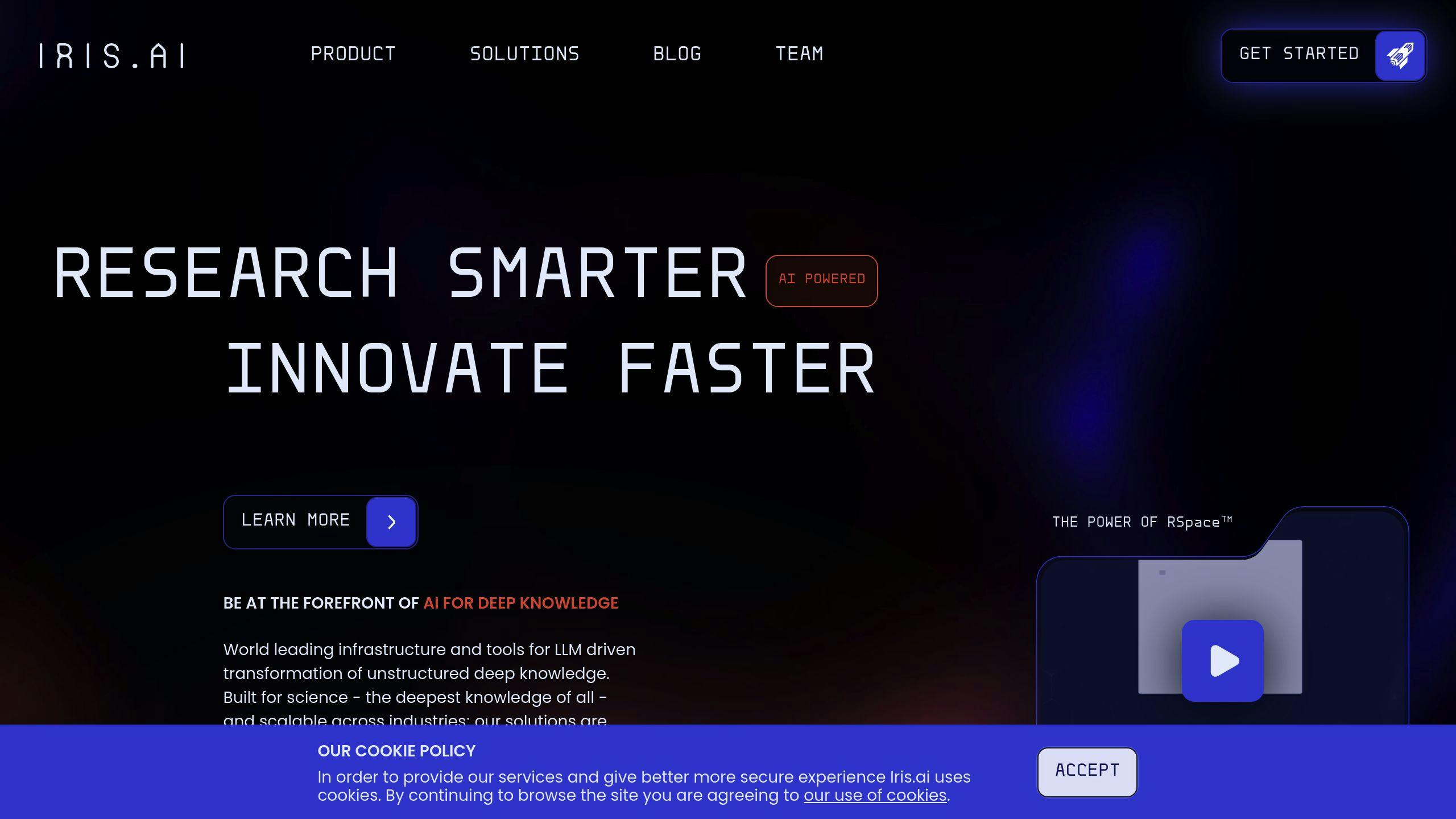
Iris AI creates visual maps of academic research, showcasing connections between studies using advanced natural language processing. Its algorithms analyze extensive academic databases, changing how researchers navigate scientific literature.
Core Features and Capabilities
| Feature | Capability | Benefit |
|---|---|---|
| Content Analysis | Processes scientific texts with NLP | Quickly identifies relevant papers |
| Data Extraction | Extracts information from PDFs and articles | Simplifies data collection |
| Visual Mapping | Generates visual research maps | Clarifies connections within a field |
| Systematic Review | Summarizes and organizes structured data | Speeds up literature reviews |
Research Impact and Applications
With 66% of researchers overwhelmed by the growing volume of literature, Iris AI steps in with automated tools for filtering and analysis. It shines in tasks like literature reviews, data extraction, research tracking, and cross-language support, making it easier to analyze diverse sources.
While Elicit emphasizes search and summarization, Iris AI goes further with its systematic review capabilities and visual mapping. It also stands apart from Research Rabbit by combining visual tools with advanced data extraction and structured analysis.
Access and Pricing
Iris AI offers free features for basic research but unlocks advanced options - like unlimited searches and detailed data extraction - through premium plans. Pricing is tailored and available upon request.
Though Iris AI specializes in systematic research tools, Perplexity AI takes a conversational path to academic exploration, which we'll dive into next.
5. Perplexity AI
Perplexity AI is a highly effective academic search tool that combines real-time data retrieval with AI-powered analysis. Unlike standard search engines, it processes natural language queries to provide detailed, citation-supported results tailored specifically for academic research. This makes it a great choice for researchers looking for timely and accurate insights into scholarly topics.
Advanced Search Features
The platform's "Academic" mode uses real-time web crawling and access to academic databases to deliver reliable, up-to-date results. Its focus on credibility ensures researchers can quickly locate relevant academic material while maintaining high-quality standards.
| Feature | Description | Benefit |
|---|---|---|
| Real-time Search | Live web crawling and database integration | Access to the latest research |
| Dynamic Follow-up Questions | Conversational topic exploration | Gain deeper understanding |
| File Analysis | PDF and document processing (Pro version) | Speeds up literature reviews |
Pricing and Access Options
Perplexity AI offers flexible pricing plans to suit various research needs:
- Free Plan: Includes unlimited quick searches and five Pro searches daily.
- Pro Plan ($20/month): Provides over 300 Pro searches daily, GPT-4 Omni and Claude 3 models, unlimited file analysis, and priority customer support.
Practical Uses in Research
Perplexity AI simplifies academic research by breaking down complex queries into clear, actionable results. Its conversational approach makes it particularly useful for exploratory research and literature reviews.
While Iris AI leans on visual mapping and systematic reviews, Perplexity AI focuses on interactive engagement with academic content. This makes it a strong option for researchers who need real-time insights and a user-friendly interface. It’s an excellent addition to the list of Elicit alternatives, especially for those prioritizing conversational search capabilities.
Feature Comparison Table
Here's a breakdown of how these tools compare in terms of features, pricing, and their ideal use cases:
| Feature | Sourcely | Semantic Scholar | Research Rabbit | Iris AI | Perplexity AI |
|---|---|---|---|---|---|
| Core Search | AI-driven multilingual search | Citation-based search | Visual exploration of papers | Visual mapping and systematic review support | Real-time AI-powered analysis |
| Source Coverage | Over 200M academic papers | Academic journals and papers | Microsoft Academic Graph data | Scientific literature | Multiple academic databases |
| Key Features | Source discovery, Citation tools, PDF access | Citation tracking, Impact metrics | Paper networks, Visual maps | Research mapping, Data extraction | Real-time search, File analysis |
| Free Plan | Up to 300 characters | Full access with basic features | Full access | Limited features | 5 Pro searches daily |
| Paid Plans | - $5 (2000 words) - $9/month unlimited - $87/year |
Premium features available | Free only | Enterprise pricing | $20/month (Pro) |
| Best For | Affordable, quick source discovery | Citation-focused reviews | Visual citation networks | In-depth literature reviews | Conversational AI for exploratory research |
| Limitations | Free plan character limit | Restricted to academic papers | Relies on 2021 data [1] | Steeper learning curve for visual tools | Few free searches available |
Key Differentiators
Each tool shines in different areas. Sourcely is ideal for those needing multilingual support on a budget. Research Rabbit focuses on visualizing paper networks and collaboration. Perplexity AI offers conversational searches with real-time results. Iris AI specializes in systematic reviews and visual mapping, while Semantic Scholar is perfect for citation tracking and finding reliable sources.
Your choice depends on your research goals, budget, and workflow preferences. Explore these options to find the tool that fits your academic needs best.
Conclusion
As we approach 2025, AI-driven academic research tools are offering smarter ways to tackle a variety of research needs. Each tool we've examined stands out in its own way, catering to specific workflows and preferences.
Sourcely shines with its multilingual capabilities, flexible pricing, and access to over 200 million papers, making it a great choice for budget-conscious students and researchers. Research Rabbit is perfect for visualizing research connections, although its reliance on 2021 Microsoft Academic Graph data [1] means it’s best paired with other tools for up-to-date literature. Iris AI is a strong option for systematic reviews, while Semantic Scholar is excellent for tracking citations. Meanwhile, Perplexity AI introduces conversational analysis to research, adding a fresh dimension to how we interact with data.
When choosing the right tool, think about factors like your research scope, budget, and how well the tool fits into your workflow. For a detailed comparison of features and pricing, check the table above. Using multiple tools together can also help you make the most of their individual strengths.
As AI technology evolves, these tools are only going to get better. Take advantage of free plans to test features before committing to a paid option. Picking the right tool now can make your research more efficient and accurate while saving you time.
FAQs
Here are answers to some common questions about Elicit and academic search tools to help you decide which might work best for your needs.
Is Elicit AI worth it?
Elicit AI is a helpful tool for handling research literature efficiently. It stands out with features like smart paper summarization, automated research workflows, and advanced search filters [3][4]. While it's a strong option for many researchers, comparing its features with other tools can help you figure out which platform suits your workflow best.
What is the best free academic search engine?
Google Scholar is often the go-to free academic search engine due to its broad coverage. However, other options like BASE (Bielefeld Academic Search Engine), CORE, Semantic Scholar, and Science.gov shine in specific areas such as open-access research or citation tracking [2].
Using a mix of tools can be a smart strategy. For instance, combining Google Scholar's extensive database with Semantic Scholar's citation tracking can give you a more complete research experience. These free tools can also work well alongside AI-powered platforms, especially if you're working within a tight budget.